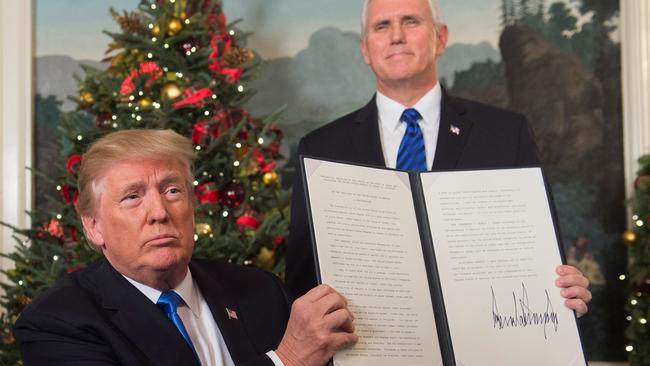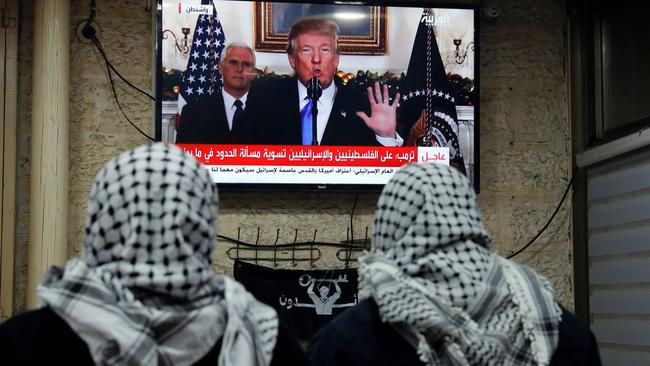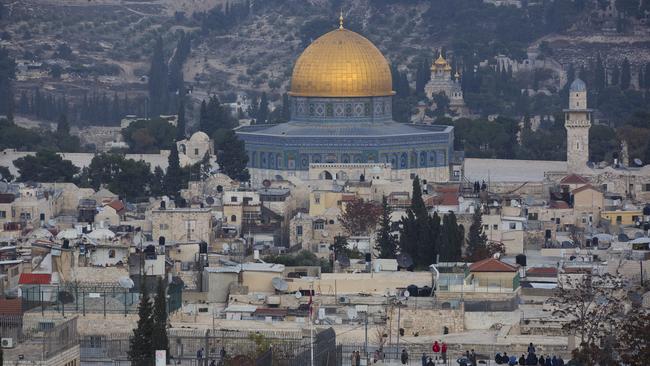Opinion: Why Trump’s Israel plan will be good for the region
Donald Trump’s move to shift the United States’ embassy in Israel from Tel Aviv to Jerusalem is being portrayed in many quarters as more controversial than a week’s worth of Milo shows. But it has the potential to break through the fifty-year deadlock that has been the “peace process”.
Opinion
Don't miss out on the headlines from Opinion. Followed categories will be added to My News.
Donald Trump’s move to shift the United States’ embassy in Israel from Tel Aviv to Jerusalem is being portrayed in many quarters as more controversial than a week’s worth of Milo shows.
But not only is it the right thing to do, it has the potential to break through the fifty-year deadlock that has been the “peace process”.
For one thing, the shift in policy does something that stops the double standard by which Israel is the only country in the world that is, apparently, not allowed to declare its own official capital.

On a practical level, most of the Israeli government works out of Jerusalem, it is where the country’s parliament sits, and having ambassadorial functions off in Tel Aviv makes about as much sense as putting America’s Australian embassy in Wagga Wagga rather than Canberra. (Though, to be fair, Tel Aviv has better beaches than Wagga.)
But more importantly, the move ends the “violence veto” of the Palestinians, who have for decades used threats of unrest from riots and demonstration to outright terrorism to cow Western nations into following their line.
In the run-up to the announcement, Palestinian leaders called for “three days of rage” in protest, and pundits have warned of unrest.
By carrying through with the move (which was authorised by Congress more than 20 years ago but delayed with waivers by previous presidents) Trump is essentially saying, well, have your days of rage, and then when you’re ready to get serious about peace, we can talk.
In diplomacy as in life, you reward the behaviour you want more of, and in allowing threats of outrage to determine policy, decades of US administrations have encouraged more of the same.

Of course, it may take some time for the Palestinians to get the message. Palestinian President Mahmoud Abbas reasserted Palestinian claims to Jerusalem saying, “It’s an attempt to change our history, and it will not succeed. (Jerusalem) is a Palestinian city — an Arab city, a Christian city, and a Muslim city.”
Notice who Abbas left out? It does seem ironic, as American Jewish commentator Noah Pollak pointed out, that the Palestinian president “is simultaneously complaining that (the) US and Israel are undermining that chance for peace, and declaring that Israel has no right to exist.”
All of this takes place in the background of a Middle East where alliances are rapidly shifting and things that were not possible are all of a sudden becoming reality.
In an effort to counter Iranian attempts to dominate the region, Israel and Saudi Arabia have been quietly increasing both commercial and security ties.

The Saudis, whose old guard is undergoing a purge thanks to the efforts of Crown Prince Mohammed bin Salman and whose oil resources have been a major economic lifeline for the Palestinians, have also been moving on the issue. A few days ago they suggested they could have not Jerusalem but the Jerusalem suburb of Abu Dis as the capital of a future state.
And in a little-remarked development earlier this month, Saudi Arabia’s grand mufti issued a fatwa, or religious proclamation, declaring it was wrong to fight Israel and declaring Hamas a terrorist organisation.
In this context it is hardly inconceivable that the Saudis will have further quiet words to Abbas about taking a more constructive stand once the days of rage are out of their system.
While many are reluctant to give Trump credit for any wins either on domestic or foreign policy, it is hard not to see all these moves as being a co-ordinated effort in the wake of his May trip to Saudi Arabia.

Of course, while this is all happening at a high level, it will still be what happens on the street that matters.
Or as Golda Meir once put it, “We will only have peace with the Arabs when they love their children more than they hate us.”
James Morrow is opinion editor of the Daily Telegraph



